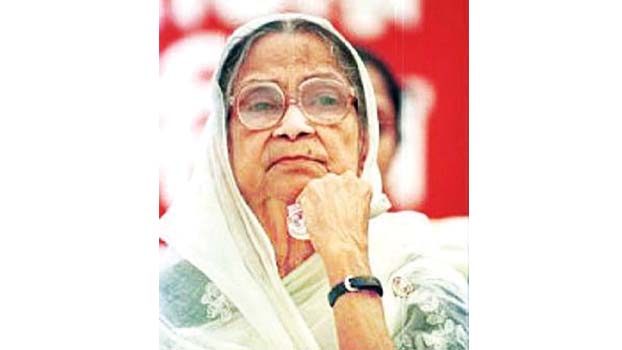Sufia Kamal, echelon of women emancipation

Today is the 108th birth anniversary of Sufia Kamal, a Bangladeshi poet, political activist and feminist who is vastly responsible for building the womenfolk as self-reliant in Bangladesh. She died at the age of 88 on November 20 and was born today in 1911 in Barisal. At the time of her death, she was granted Ekushey Padak, the highest honour and recognition from Bangladesh which made her the first woman to receive that recognition in the country.
Born into wealth, she had devoted her life to struggling for the rights of women and the poor and against the forces of religious fundamentalism. She was regarded as a beacon for all democratic movements of the nation by Prime Minister Sheikh Hasina.
Sufia Kamal was born as the only daughter of an eminent lawyer and as a woman, she did not have any opportunity to chase an education, but she educated herself in her uncle's library with her mother's encouragement. She was doing all this at a time when it was taboo for girls to study anything other than religious scriptures.
She was first married at the age of 11 but her first published story was at the age of 14. Following this, her poems and prose grew attention towards her. At the time, she started writing more and more about religious communalism, fundamentalism and superstitions. She promoted democracy and women's emancipation in the country. Many of her writings were later translated into English and Russian.
Despite much challenges faced by Begum Sufia Kamal, she came in contact with literary giants, social activists and academicians like Rabindranath Tagore, Kazi Nazrul Islam and other notable persons. Her ideas of women emancipation in the country was much appreciated by those who were of likeminded.
Excerpt from the poem
Our Language: The Language of Bengal
For our language many have died,
drawn from the arms of our mother
but down the road, smeared with their blood
I hope freedom will come to this land:
the simple language of a simple people
Will meet the demands of this our land.
Previously the culture was to keep women at home and away from any active role in the society. Women were trained in household chores and make them submissive and ready to serve the other members of the family. But she had an indomitable nature and in the anti-British rule movement before the partition, she broke all the social chains and crossed all the boundaries and tried to get a taste of what was going on at the moment.
She used Bangla to write which she wasn’t allowed to learn but she acquired from those at her household. When her first husband died, she became a widow at age 21 and with a daughter, she took the bold decision of becoming a school teacher in Kolkata for a mere 50 rupees.
She had to face a lot of social scrutiny as the conservative society of that time was up to her throats. At such a time even her family denounced her close association with scholars and renowned literary people. This didn’t matter to her at all instead she rose against these people and took the challenge to establish herself as a fighter for women freedom around the country.
Her work reflected the struggles to preserve the Bengali language and culture and to fight Pakistani rulers even though she called herself a romantic poet. During Bangladesh's struggle for independence from Pakistan in 1971, she worked to help women who were victims of the war. She also worked with an organization to try to bring to justice those Pakistani officials whom the Bangladeshis considered war criminals.
As a woman, her own experiences made her sensitive towards the condition of women of all classes. Whether it was poor or upper class, the violence against women in family, society and public life was always there and to some extent, women were and still are exploited and deprived of opportunities.
On top of all this, her strongest and most considerate emotions may have appeared in her poems rather than her prose.



